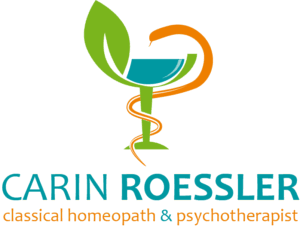Welcome to Classical Homeopathy and Psychotherapy!
Homeopathy is based on the healing principle that a substance capable of causing certain symptoms in a healthy person can also help relieve those same symptoms in someone who’s sick.
A simple example is the onion. When you peel and cut an onion, your eyes start to sting and your nose runs. A homeopathic remedy made from onion (Allium cepa) is sometimes used for allergies, hay fever, or colds that cause similar watery eyes and runny noses.
Homeopathy takes a holistic approach — it treats the whole person: body, mind, and emotions. A classical homeopath sees illness or discomfort as signs of an inner imbalance (“dis-ease”) on the physical, mental, or emotional level. This overall state is taken into account when selecting a homeopathic remedy.
Classical homeopathy was developed by the German physician Samuel Hahnemann (1755–1843). It has been practised for more than 200 years and, according to the World Health Organization (WHO), is one of the most widely used systems of medicine in the world.
Homeopathy — What It Can Help With
Homeopathy can be used to treat almost any kind of symptom or health condition, both acute and chronic. Most people turn to homeopathy for chronic problems that haven’t improved despite years of trying different treatments, such as skin issues, anxiety, allergies, digestive troubles, or recurring infections of the upper airways.
Homeopathic medicine is gentle and effective, and has no side effects when used as prescribed. It helps millions of people of all ages around the world.
In Sweden, it’s unfortunately illegal to treat pregnant women and children under eight years old with homeopathy. Treatment is always individual, tailor-made, and the choice of remedy is based on each person’s unique combination of symptoms.
That’s why five people who all appear to have the same problem, for example “stomach pain,” may each receive five different homeopathic remedies.
By comparing the “symptom picture” of a homeopathic remedy with a person’s individual symptoms, your homeopath treats you as a unique individual, not as a diagnosis.
Homeopathic medicines are prepared from natural substances such as plants, minerals, or animal sources, which are diluted many times and vigorously shaken at each step. Through this standardized process of repeated dilution and shaking, the remedy becomes more and more potent. This process is called potentization and it defines all homeopathic medicines.
Because of the extreme dilution involved in making homeopathic remedies, they are non-toxic and safe for all ages, including pregnant women and those who are breastfeeding. Since they are free of toxic ingredients, they are also environmentally safe.
At present, there is no simple scientific explanation for how potentized homeopathic remedies work. But just as aspirin was used successfully for decades before anyone understood how it worked, homeopathic medicines continue to be used effectively without a full scientific explanation of the healing process.
More than two hundred years of documented experience in treating millions of people and animals show that homeopathy can be a powerful and effective form of medicine.
Homeopathy can help with a wide range of health issues, from allergies and skin conditions to shingles, whether the origin of the problem is physical, mental, or emotional. A well-chosen homeopathic remedy can bring rapid relief in acute situations, such as viral infections or physical injuries, by reducing symptom intensity and shortening recovery time.
Many common childhood ailments such as diaper rash, colic, ear infections, and teething discomfort respond remarkably well to homeopathy. Many women also find significant relief during pregnancy, childbirth, irregular menstruation, PMS, and menopause.
Homeopathic treatment can be especially helpful for long-standing chronic conditions that have developed over time and are often accompanied by an overall decline in health. These include many well-known medical issues such as acne, anxiety attacks, allergies, psoriasis, and digestive disorders.
Even in advanced stages of illness, where cure may not be possible, homeopathy can ease or reduce distressing symptoms such as pain, nausea, anxiety, and fear.
About me
 My name is Carin Roessler, and I have been helping people improve their well-being through homeopathy since the year 2000. I have always been drawn to working for and with people, so I first trained as a social worker at Umeå University in Sweden.
My name is Carin Roessler, and I have been helping people improve their well-being through homeopathy since the year 2000. I have always been drawn to working for and with people, so I first trained as a social worker at Umeå University in Sweden.
A few years later, I moved to Ottawa, Canada, where I continued my studies in psychology and psychotherapy before later training to become a classical homeopath.
I am a social worker and psychotherapist. My education includes a B.A. (Honours) in Psychology, an M.S.W. from Carleton University in Ottawa, Canada, and a degree in Social Work from Umeå University in Sweden.
I have also completed additional professional training and courses of various lengths, including cognitive behavioural therapy (CBT), dialectical behavioural therapy (DBT), individual, couple, and family therapy, child therapy including play therapy, mediation, addiction counselling, grief counselling, and trauma and crisis intervention.
I have over 30 years of experience working as both a social worker and psychotherapist with children, adolescents, and adults in several countries, including Sweden, India, and Canada. My work has taken place in a variety of settings such as schools, hospitals (especially in psychiatry and emergency departments), community health centres, private clinics, and in my own practice.
My interest in homeopathy began in 1994, when I personally witnessed for the first time how homeopathic treatment could bring healing in a serious illness, even when conventional medicine had no effect or nothing to offer. Having been a sceptic at first, I then began studying both medicine and homeopathy.
My homeopathy education includes three years at the Canadian College of Homeopathic Medicine (CCHM) in Toronto, followed by two additional years of study in the Homeopathic Master Clinician (HMC) program, also in Toronto.
I continue my professional development with great interest through international seminars led by experienced and well-known homeopaths such as Misha Norland (UK), Louis Klein (Canada), Jan Scholten, Alize Timmerman (Netherlands), Rajan Sankaran, Farouk Masters (India), Paul Herscu, and Will Taylor (USA).
I want to point out that I am not opposed to conventional medicine. I believe that both classical homeopathy and conventional medical care should be available to help people recover and maintain their health as fully as possible.
Since 1980, I have worked almost continuously in Canada as a social worker and psychotherapist, and since the year 2000, I have also been practising as a classical homeopath.
I have recently returned to Sweden and now have practices in both Classical Homeopathy and Psychotherapy, located in Södermalm, Stockholm, and in Dalvik/Falun.
Authorized Classical Homeopath (KHY)
Authorized Social Worker (SSR)
Registered Classical Homeopath in Canada (CSH)
Registered Social Worker and Psychotherapist, OCSWSSW
I am a member of the following professional organizations:
Canada:
Canadian Society of Homeopaths (CSH)
Association of Naturopaths (ANN)
Ontario College of Social Workers and Social Service Workers (OCSWSSW)
Sweden/Europe:
Klassiska Homeopaters Yrkesförbund (KHY)
European Central Council of Homeopaths (ECCH) www.homeopathy-ecch.org
Consultations
NO NEW PATIENTS ARE BEING ACCEPTED AT THE MOMENT
Classical homeopathic treatment is based on selecting a carefully chosen remedy that most closely matches all of your symptoms at the time of consultation. After that, we wait and observe how you respond before giving another remedy. This approach is also known as the “Hahnemannian method” or “constitutional treatment.”
The first appointment lasts about 1 to 1.5 hours.
Your homeopath will ask you for detailed information about your physical, mental, and emotional health, as well as your likes and dislikes. This helps your homeopath understand your unique individuality. It is also important to learn about your reactions to the world around you, such as weather, temperature, foods, and other external factors. Your homeopath will also look for possible factors that may have contributed to or caused your illness, including stress, shock, trauma, family history, or inherited tendencies.
Sometimes your homeopath will give you the remedy during the first visit, but often she will study all the information you have provided and send the remedy to you within a week.
A follow-up appointment is usually scheduled after 4 to 6 weeks to see how effective the remedy has been.
Homeopathic treatment of chronic conditions is a process that can take time, especially if other medications are involved. Your homeopath will need several follow-up visits to assess how you are responding to the remedy and to decide whether to repeat it, adjust the potency, or continue with a different one.
The first visit includes a full case history and review of your health and medical background, a homeopathic analysis, and the homeopathic remedy.
First consultation: 1 to 1.5 hours
Follow-up appointments every 4 to 6 weeks
Follow-up duration: 30–45 minutes
Patient stories

© Av Margot Granvik, vetenskapsjournalist och klassisk homeopat,https://klassiskahomeopater.se
The eczema on my hands was itchy and weeping.
Her skin cracked and the wounds hurt. It became unbearable at work, where Johanna has to wear gloves.
Johanna, 26, loves her job caring for dairy cows, so despite troublesome eczema, especially on her hands, she didn’t want to change jobs.
„The worst was when the cows calved and I had to milk them by hand. I tried cotton gloves and then plastic gloves on top, but my hands got wet inside the gloves. That made my skin burn and sting.
The watery eczema caused the skin on my hands to flake and crack.
“I had many sores that hurt a lot. In the mornings, it felt better when the sores had healed a little during the night, but when I started moving my hands, the sores cracked open again and started bleeding. It was painful.”
The eczema broke out in the early 2000s, but when Johanna started working with dairy cows, her skin problems got worse. Johanna struggled with the painful eczema for seven years before she began treatment with homeopath Carin Roessler in early summer 2018.
“It was a bit up and down, but slowly my skin started to get better.”
Johanna reacted immediately to the first homeopathic remedy, and after just two months, the eczema had improved noticeably. I was surprised myself.
Even though she wore gloves at work and sweated, she did not have any new outbreaks of eczema. It flared up a little again during a difficult period. She came back to me and I continued the classic homeopathic treatment for her whole body.
„In my experience, it can take a long time to get rid of troublesome eczema. The main factors that determine how long it takes to heal eczema are how long you have had it and whether you have used strong ointments to inhibit the eczema.
In homeopathy, we see eczema as something the body wants to get rid of and expel, from the inside out. Ointments, especially strong ointments such as cortisone, achieve the opposite. Our experience is that ointments “push in” the eczema, making it more difficult for the body to get rid of it. Therefore, the healing process takes longer if you have used ointments frequently for many years.
It is completely understandable to use ointments because they provide relief from eczema. Unfortunately, however, they often create more problems and worse eczema in the long term. We also see that eczema can appear in more places.
During healing, the rash may also worsen for a short time before it gets better. But the right homeopathic remedy will heal the eczema. The patient must be patient during the healing process.
© By Margot Granvik, science journalist and classical homeopath, https://klassiskahomeopater.se
Kontakt & Länkar
NO NEW PATIENTS ARE BEING ACCEPTED AT THE MOMENT
CARIN ROESSLER
FALUN:Dalvik 645
791 92 Falun
Sweden
STOCKHOLM:
Fredmansgatan 11
118 47 Stockholm
Sweden
Links::
- CSH Canadian Society of Homeopaths
- CCHM Canadian College Of Homeopathic Medicine
- ANN Association of Naturopaths
- OCSWSSW Ontario College of Social Workers and Social Service workers
- KHY Klassiska Homeopaters Yrkesförbund
- ECCH European Central Council of Homeopaths (www.homeopathy-ecch.org)
- Dagens Homeopati
Privacy
DATASKYDD & IMPRESSUM
Responsibility for the processing of personal data
The person responsible for processing personal data on this website in accordance with the General Data Protection Regulation (GDPR) is
CARIN ROESSLER
Dalvik 645
79192 Falun
Patient consent to the processing of personal data
A classical homeopath handles personal data in accordance with Swedish law. When your personal data are registered and processed, you have the right to certain information.
In connection with treatment, your homeopath records your personal data in a medical file. The information noted includes personal identity number, name, address, telephone number, and email address.
Name, address, telephone number, and email address also appear on invoices.
Records are stored for ten years. Accounting documents (invoices) are kept for seven years.
Purpose
Your personal data are necessary to maintain contact during treatment, to follow up on progress, and to issue invoices. The processing is lawful because it is required for treatment. These data are considered sensitive.
Your data are handled by your treating homeopath, who is responsible for storing records securely. Invoices containing your details may be forwarded to third parties for bookkeeping or auditing.
Your homeopath provides full contact details and can be reached if you have questions.
Storage period
A classical homeopath who is a member of the professional association Klassiska Homeopaters Yrkesförbund (KHY) follows its ethical code. According to these rules, records are kept for ten years to allow follow-up visits. Ten years after treatment has ended—the last follow-up—the homeopath securely destroys the records. Accounting material is destroyed after seven years.
Your rights
Under Swedish law you have the right to request access to your personal data. Contact your treating homeopath.
You also have the right to file a complaint with the Swedish Authority for Privacy Protection (Datainspektionen) if you are dissatisfied with how your data are processed.
Consent
When treatment begins, you as a patient give consent for your homeopath to process your personal data as described above.
Responsibility for processing of personal data
The person responsible for data processing on this website in accordance with the GDPR is as stated above.
This privacy policy explains how we process your personal information (hereinafter referred to as “data”).
Processing of personal data
We process personal data as part of operating this website. Processing may include transfer of data. Transfers of personal data to the United States are regulated by the EU–US Privacy Shield, a data-protection framework approved by the European Commission. The framework ensures that data transfers to certified U.S. companies provide the same level of protection as within the EU. When we transfer data to the U.S., we ensure that our service providers are certified under the EU–US Privacy Shield. The specific types of data affected, the purposes of processing, legal bases, recipients, and any transfers to third countries are described below.
Log files
We record visits to our website and process the following data: name of the page visited, date and time of visit, amount of data transferred, browser type and version, operating system, referrer URL (previously visited page), IP address, and internet service provider. This is necessary to maintain website security. Processing is based on our legitimate interests in accordance with Article 6(1)(f) GDPR. Log files are deleted after seven days unless required to investigate or prove specific legal violations discovered during that period.
Hosting
Within the scope of hosting, all data processed for operating the website are stored. This is necessary for the site to function. We process these data under our legitimate interests according to Article 6(1)(f) GDPR. For our online presence we use web-hosting services to which the above-mentioned data are transmitted.
Contact
If you contact us, your information (name and contact details, if provided) and your message will be processed solely for the purpose of responding to your inquiry. This is done under Article 6(1)(b) GDPR or Article 6(1)(f) GDPR, depending on the context.
Cookies and external content
We use cookies and external dynamic content to optimize the design and content of our website. When you visit the site, an automatic request is sent to the external content provider’s server via API, transferring some information (for example, your IP address). The requested content is then delivered to and displayed on our site.
Integration of YouTube videos
We embed videos from YouTube LLC, 901 Cherry Ave., San Bruno, CA 94066, USA (“YouTube”). When a video is played, log data are transmitted to YouTube’s servers in the U.S. Processing is based on our legitimate interest in optimizing marketing of our services under Article 6(1)(f) GDPR.
YouTube certification: https://www.privacyshield.gov/participant?id=a2zt000000001L5AAI&status=Active
Privacy policy: https://policies.google.com/privacy?hl=en
Google Maps
We use Google Maps to provide an interactive map. When the map is displayed, information including your IP address and location is transmitted to Google’s servers in the U.S. Processing is based on our legitimate interest in improving our service and marketing under Article 6(1)(f) GDPR.
Google certification: https://www.privacyshield.gov/participant?id=a2zt000000001L5AAI&status=Active
Privacy policy: https://policies.google.com/privacy?hl=en
Data storage period
We store personal data only as long as necessary for the purpose for which they are processed or until you withdraw consent. Where legal retention obligations apply, certain data may be kept for up to ten years regardless of use.
Your rights
Information and access: you may at any time, free of charge, request information about the personal data we hold about you.
Correction, deletion, restriction, or objection: if you no longer consent to storage or if your data are incorrect, you may request deletion, blocking, or correction (where permitted by law). The same applies if you wish to restrict future processing.
Data portability: upon request, we will provide your data in a commonly used, structured, machine-readable format so you can transfer them to another organization.
Right to complain: complaints may be directed to the supervisory authority, https://www.datainspektionen.se
Right to withdraw consent: you may withdraw consent at any time with effect for the future; withdrawal does not affect lawful processing carried out before that time.
Restrictions: the above rights do not apply to data we cannot identify to you (for example anonymized analytics data). You can exercise your rights by providing sufficient information for us to verify your identity.
To exercise any of these rights or if you have questions about the processing of your personal data, please contact us at carin@roessler-burckhardt.com.
© Carin Roessler

